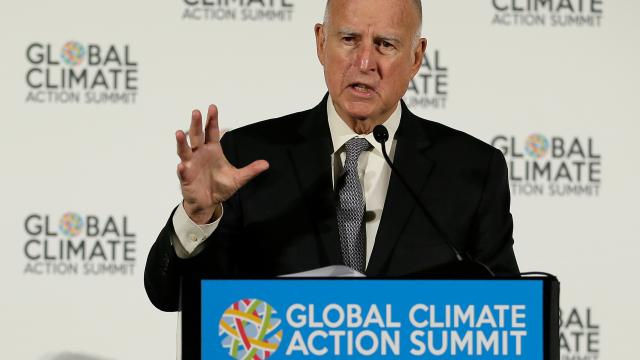California Governor Jerry Brown announced on Friday at the Global Climate Action Summit that the state would be launching its “own damn satellite” amid concern that Donald Trump’s administration is minimising NASA’s role in climate research, Politico reported.
Brown has had a hostile relationship with the Republican-controlled White House, which has attacked California’s more logging on federal lands. According to Politico, Brown touted the plans for a satellite as part of a project to ensure that the state can monitor greenhouse gas emissions fuelling climate change even if Trump and his allies in Congress cut budgets for similar NASA programs. The site wrote:
“We’re going to launch our own satellite — our own damn satellite to figure out where the pollution is and how we’re going to end it,” Brown told an international audience on the final day of the San Francisco gathering.
California will work with San Francisco-based Planet Labs to launch a satellite capable of tracking climate-altering emissions, Brown said. The effort will lean on the expertise of the state’s Air Resources Board, which has taken the forefront in pursuing climate-related innovations.
…“In California, with science under attack — in fact we’re under attack from a lot of people, including Donald Trump, but the climate threat still keeps growing. So, we want to know what the hell is going on all over the world, all the time.”
In May, the journal Science reported NASA’s Carbon Monitoring System (CMS), which monitors greenhouse gas emissions from a network of aircraft and satellites, was in the crosshairs of budget-slashing White House aides. CMS is important to a number of climate change-related projects, such as verifying compliance with climate targets and helping to merge various sources of climate data like future space-based carbon observatories. The House appropriations panel that manages NASA restored funding for the program within weeks, but its continued survival is in doubt, the Union of Concerned Scientists wrote in June.
According to Quartz, the satellite is intended to track the “point source” of various pollutants entering the atmosphere (though by far the biggest source of those pollutants is the transportation sector, which has actually been increasing in total emissions in recent years). The state has yet to issue any cost estimates or proposed launch date, though Quartz noted that Planet Labs specialises in producing “a new generation of low-cost satellites to replicate and exceed the capacity of costly, traditional space projects”:
Now, after raising nearly $US200 million from venture investors including DCVC and Google, the company operates 150 satellites, the world’s largest private fleet, representing more than 10% of the active satellites in orbit. Each day, it collects imagery of earth’s entire landmass, a mind-boggling amount of data which Planet sells to customers including journalists and hedge funds, agribusiness and governments.
The San Francisco Chronicle wrote that state officials claim the data from the satellite could “help remove the equivalent of about 200 million vehicles from the road each year.”
“To my knowledge, this is the first state or regional entity to launch a satellite anywhere in the world,” Environmental Defence Fund president Fred Krupp told the Chronicle. “It’s fantastic that they’re doing this.”
Brown recently signed off on a plan to switch California to entirely renewable electrical power by 2045, ditching gas and oil for sun, wind, and water.
“This is the next step in California’s continuing effort to combat global warming,” Brown said, per Politico. “… The clash has intensified because Trump, more than anybody else in the whole world in terms of national leaders, is going in the opposite direction. He’s trying to subsidise coal, undermine vehicle emission standards, sabotage clean electricity, make it harder to buy electric vehicles and on and on. So, yes, we’re going on a certain course.”
However, the governor has also faced significant criticism for declining to act against some of the “dirtiest and most dangerous kinds” of fossil-fuel extraction operators, the New Yorker wrote, including fracking and urban drilling. Brown’s climate conference was protested by a number of environmental and indigenous organisations, who said that he talks a big game but has overseen the steady expansion of oil and gas permitting that disproportionately affects communities of colour and lower-income residents.
[Politico]
